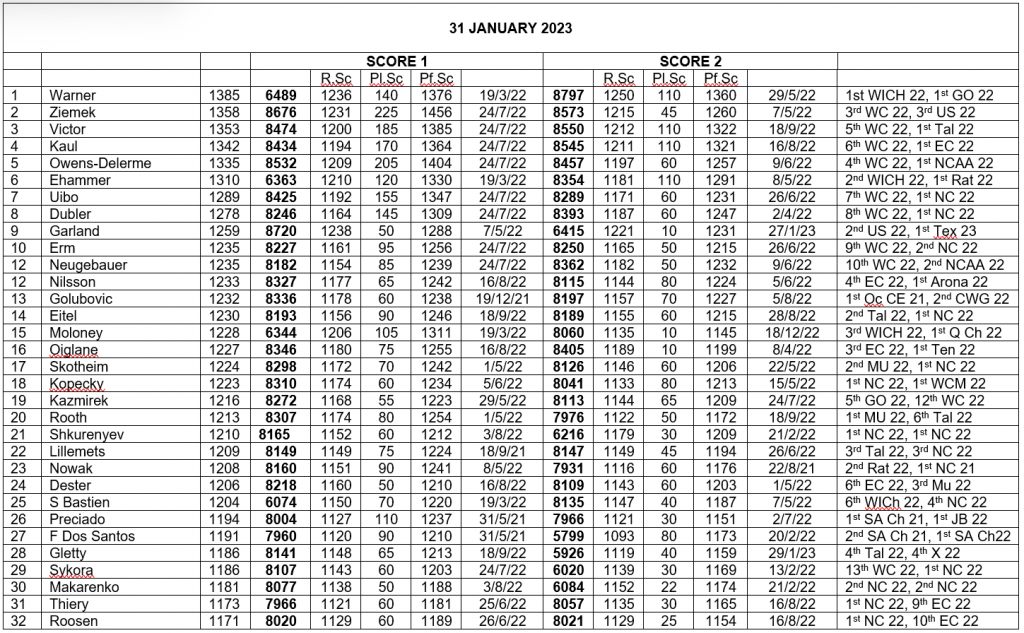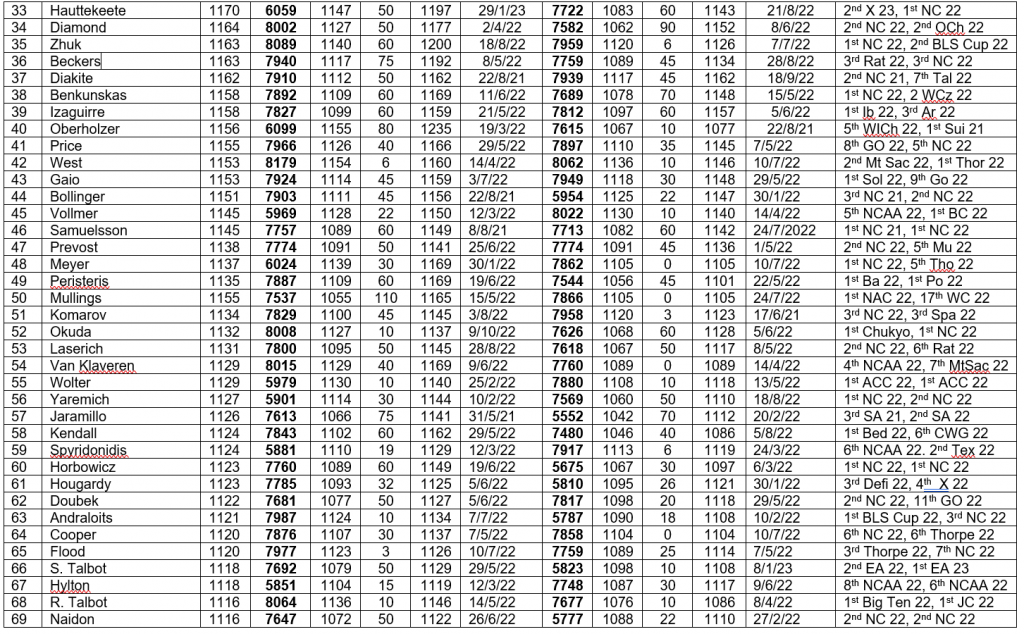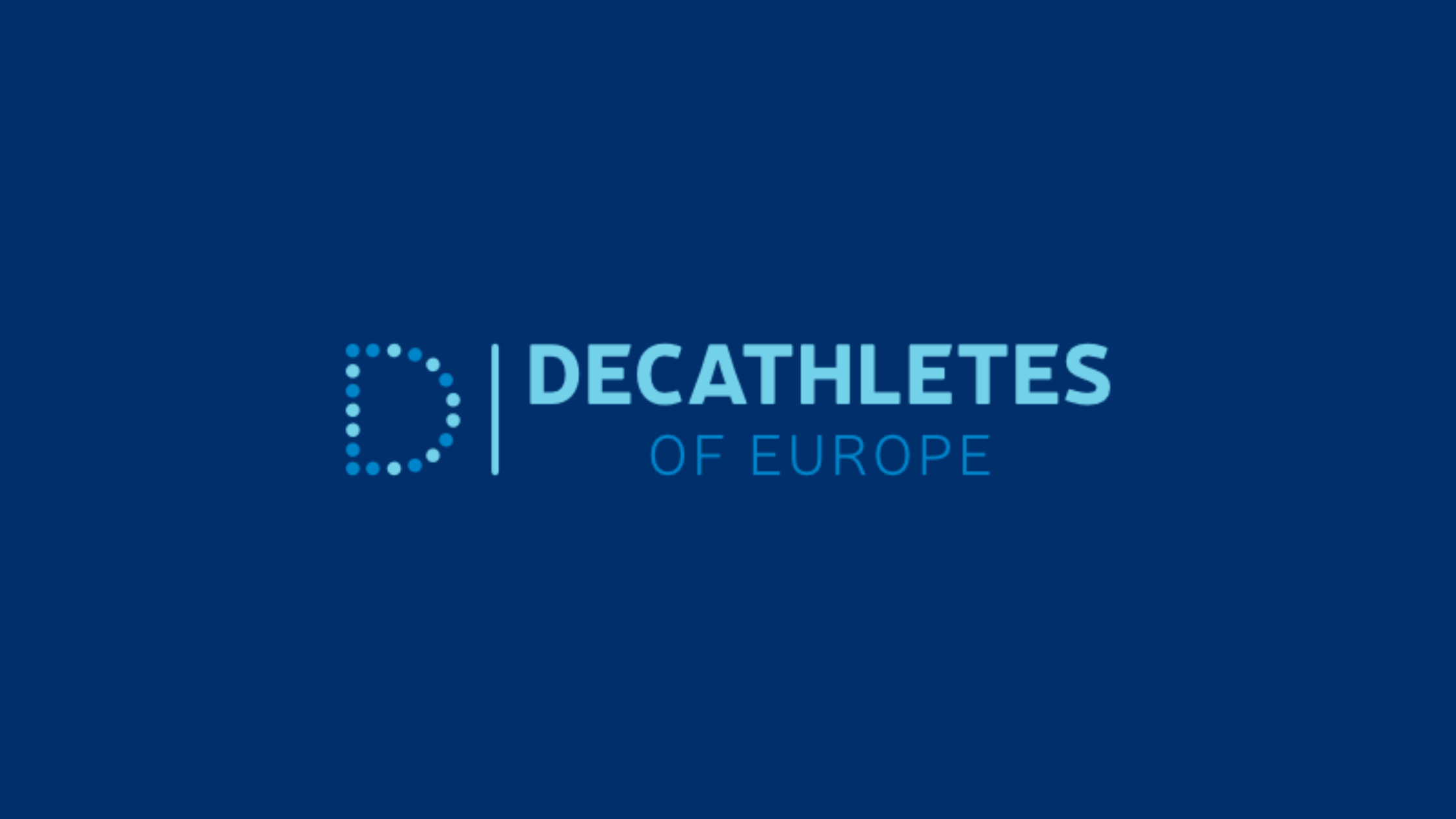This series of posts provides an analysis of key developments in the world rankings for combined events, and in qualification for major championships.
You can read a full description of the rankings system and the issues to consider when planning a strategy for qualification here.
This first post in 2023 focuses on decathlon, and initially the top 70 (the full 100 will be added in coming weeks). The table further down this page shows a line by line analysis of the scores which contributed to the current position of athletes.
While every effort is made to ensure the content is accurate, please refer to official sources before making any decisions based rankings or qualification.
The two key developments affecting the rankings in January 2023 are some rule changes, and the expiry of Olympic marks.
Rule changes
From 1 January 2023, the rule change on overweighting meant that several athletes moved places. The rule is explained in more detail here, but in summary both Olympic and World (or two World, when they both fall within the eligible period) marks can now contribute towards a ranking score.
The key impact of the change was the re-entry of unranked athletes.
Kevin Mayer was unranked from September 2022, because his World 2022 performance cancelled out his Olympic performance. His previous eligible performance, the 2021 European Indoors, was too old. The change on 1 January 2023 brought his Olympic score back into play, and he went from being unranked to first place. Several other athletes who had both Olympic and World eligible scores moved position, including to reflect some slight changes to the profile of placing points for the championships.
Expiry of Olympic marks
Rankings in January 2023 were also influenced as performances from summer 2021 began to expire, and most significantly Olympic marks. So, Kevin Mayer’s return to the rankings in January 2023 was short-lived. He is now, yet again, unranked. This also affects the 2022 World silver medallist, Pierce LePage, who now also finds himself unranked.
Points of interest
Key points of interest from the decathlon rankings as at 31 January:
- Other athletes who currently have no ranking include: Jorge Ureña, Adam Sebastian Helcelet, Pawel Wiesiołek, Rik Taam, Andreas Bechmann, Karel Tilga, Ruben Gado, Nils Pittomvils, Martin Roe, Darko Pešić and Thomas van der Plaetsen
- Some athletes are ranked but outwith the top 100 shown on the World Athletics front page (e.g. Kristjan Rosenberg, one of whose scores included a heptathlon with a NM)
- Garrett Scantling is not ranked. While he has several eligible performances, his whereabouts ban excludes him from the rankings.
- Damian Warner and Kyle Garland both have 8700+ and 6400+ scores, following Garland’s outstanding performance last weekend at the Texas Tech Multis. Warner is now No.1, but Garland only moved up three places from 12th to ninth, behind athletes with considerably lower performances indoors and out. Placing scores matter, and while they may not affect Garland (who has the World Q standard), they do matter for athletes seeking to qualify via rankings.
- The highest ranked athlete with a sub-8000 score is Marcus Rooth in 20th place
- The lowest ranked athlete with an 8000+ score (in the top 70) is Ryan Talbot in 68th place.
- The highest ranked athlete with a 0 placing score is Marcel Meyer in 48th
Performances due to expire
In the next few weeks, those athletes whose current rankings position includes performances from August 2021 may see their rankings drop as those scores expire, including (in the top 50):
- Malik Diakite
- Andri Oberholzer
- Marvin Bollinger
- Fredrik Samuelsson


European Indoor Championships 2023
Thanks to the efforts of Fredrik Samuelsson and the hundreds of athletes who supported his letter to European Athletics, there is now a small increase in the field size for Istanbul, from 12 to 14.
The rules for qualification for Istanbul 2023 can be found here, and the qualifying period ends on 19 February.
Four athletes are currently qualified by reaching either the indoor (6140) or outdoor (8400) standard from 20 August 2021 onwards:
- Simon Ehammer (Switzerland)
- Hans Christian Hausenberg (Estonia 1)
- Kevin Mayer (France 1)
- Maicel Uibo (Estonia 2)
The remaining ten quota places are occupied by the following athletes (others are higher and/or have Q standard but have presumably indicated they don’t intend to seek selection, such as Niklas Kaul, Leo Neugebauer and Janek Õiglane):
- Johannes Erm (Estonia 3)
- Marcus Nilsson (Sweden)
- Manuel Eitel (Germany 1)
- Sander Skotheim (Norway 1)
- Ondřej Kopecký (Czech Republic)
- Kai Kazmirek (Germany 2)
- Marcus Rooth (Norway 2)
- Tim Nowak (Germany 3)
- Dario Dester (Italy)
- Makenson Gletty (France 2)
The next four athletes on the rankings are:
- Jiri Sýkora (Czech)
- Baptiste Thiery (France)
- Sven Roosen (Netherlands)
- Jente Hauttekeete (Belgium)
Risto Lillemets is ahead of Nowak and technically eligible but is the fourth Estonian: however, the Estonian Federation typically decide which of their eligible athletes they will take.
Swedish participation in the European Indoors is also in doubt given current events and relationships between Sweden and Turkey.
This weekend (4-5 February) a number of athletes are competing who have the potential to either score a Q standard, or increase their ranking position and overtake others, in particular Pawel Wiesiołek, Nico Beckers and Edgaras Benkunskas (in Tallinn) and Finley Gaio (in Switzerland).

